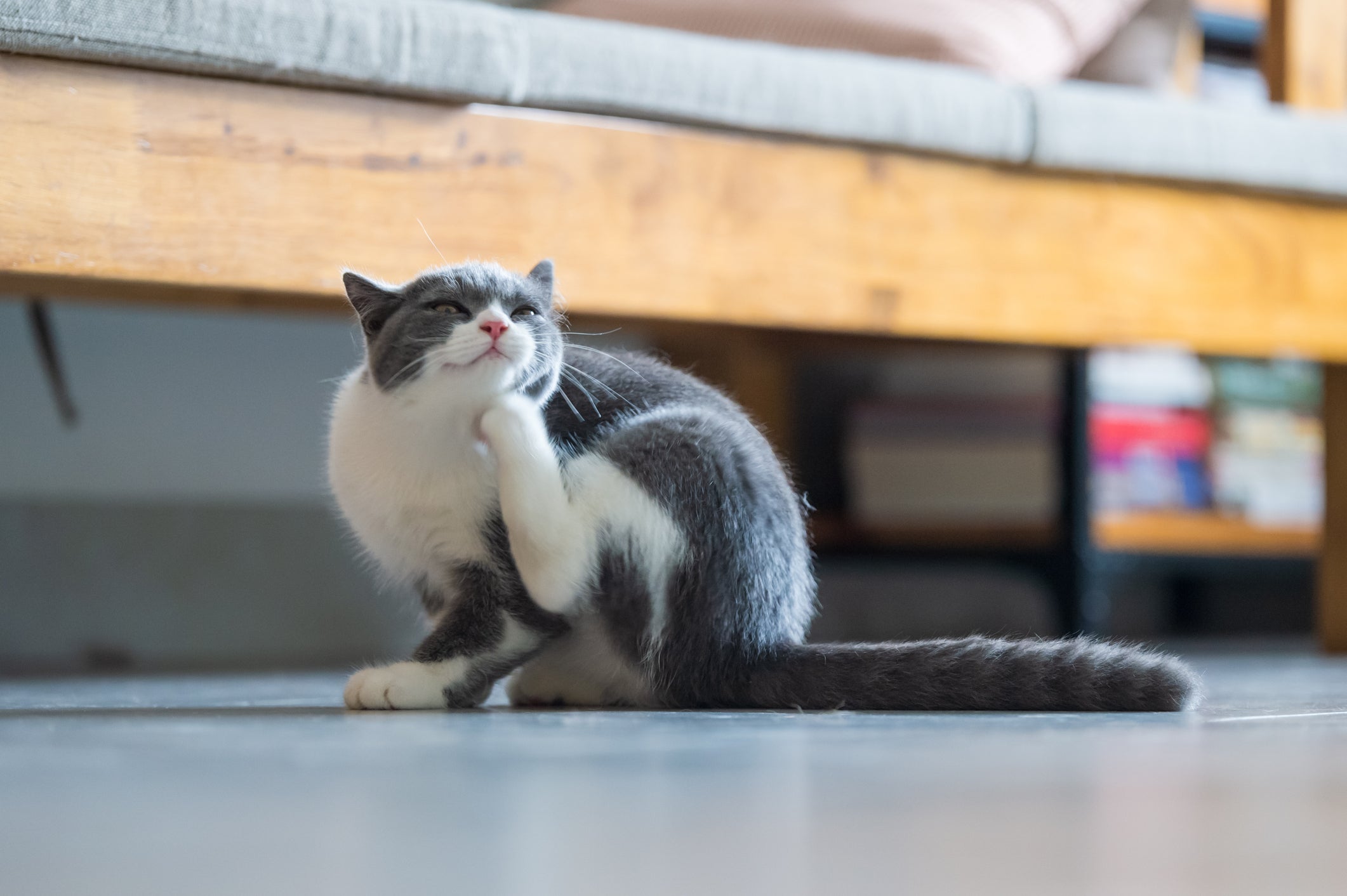How to Tell If Your Indoor Cat Has Fleas (Yes, It’s Possible!)

Your cat never steps a paw outside. So how could they possibly have fleas?
Believe it or not, even strictly indoor cats aren’t totally safe from these tiny, itchy invaders. Fleas can catch a ride on your clothes, shoes, houseguests, or even other pets, making their way inside your home before you know it.
So how do you know if your indoor cat has fleas? Here are the telltale signs to watch for, plus what you can do to help your feline friend find relief.
Key Takeaways
-
Indoor cats can still get fleas. Fleas can enter your home on shoes, guests, or other pets.
-
To check if your cat has fleas, look for signs like scratching, hair loss, or flea dirt.
-
Act fast and prevent future problems by treating your cat and home, and use natural or vet-approved flea control.
-
Check out our blog here for a complete guide for first time cat owners.
Signs Your Indoor Cat Might Have Fleas
Excessive Scratching or Grooming
If your cat is suddenly scratching more than usual, it could be due to flea bites. Some places that fleas especially like to stay around are the neck, base of the tail, or belly. Another sign is if your cat overgrooms by licking or chewing fur obsessively in irritation.
Hair Loss or Skin Irritation
You may notice thinning fur, bald patches, or red, inflamed skin. Flea allergy dermatitis (a sensitivity to flea saliva) can cause itchy welts, scabs, and open sores, especially in sensitive cats.
Flea Dirt (a.k.a. Flea Poop)
Flea dirt looks like small black specks on your cat’s fur or skin, often near the tail or belly. Try the wet paper towel test:
-
Comb some of the black specks onto a white paper towel
-
Add a drop of water
-
If it turns reddish-brown, it’s flea dirt (digested blood)
Live Fleas
You might actually see fleas crawling in your cat’s fur. They’re tiny (about the size of a sesame seed), dark brown, and fast-moving. A flea comb can help you check your cat’s coat more thoroughly.
Restlessness or Irritability
Cats dealing with fleas may act differently. They may be more agitated, restless, or just “off.” If your cat seems unusually cranky or is avoiding petting, fleas might be to blame.
Tiny Bites on You
If you or your family members are getting unexplained itchy bites, especially around ankles or lower legs, check the cat! Fleas don’t discriminate.
Keep in mind, some of these could also indicate that your cat is sick. Here is a guide on how to tell if your cat is sick.
How Do Fleas Get Indoors?
Fleas are persistent. Here’s how they might still get in:
-
Hitching a ride on your shoes, socks, or pant legs
-
Coming in with visitors or packages
-
Sneaking in through screens or doors
-
Arriving on other pets, like dogs or foster animals
-
Already present in rugs or furniture from a previous infestation
Even one or two fleas can multiply quickly into a full-blown problem, especially in warmer seasons.
What to Do If You Suspect Fleas
-
Confirm It: Use a flea comb and check for flea dirt or live fleas.
-
Treat the Cat: Talk to your vet about safe flea treatments. Some options are oral meds, spot-on treatments, or flea shampoos.
-
Treat Your Home:
-
Vacuum daily (especially carpets, rugs, and furniture)
-
Wash pet bedding, blankets, and towels in hot water
-
Use flea sprays or home treatments as needed
-
Prevent Future Infestations:
-
Consider monthly flea preventatives
-
Regular grooming and litter box cleaning help catch problems early
-
See below for some natural flea prevention tips
BOXIE TIP:
For an extra clean litter box, use BoxiePro! BoxiePro Clumping Clay Cat Litter contains probiotics that eliminate odor at the source and keep the litter box clean and fresh with every scoop.
Natural Flea Prevention Tips
1. Keep Your Home Clean
-
Vacuum frequently, especially carpets, rugs, pet bedding, and upholstered furniture. Flea eggs and larvae hide here.
-
Empty the vacuum bag or canister immediately after use to prevent fleas from escaping.
-
Wash pet bedding and blankets weekly in hot water.
2. Use Natural Repellents
-
Cedar chips: Scatter around your cat’s bedding or garden. Fleas dislike the scent.
-
Lemon spray: Steep sliced lemons in hot water overnight, then use the cooled mixture as a light mist on furniture (not directly on your cat).
-
Apple cider vinegar (ACV): Mix a 50/50 solution of ACV and water and lightly mist your cat’s fur (avoid eyes and face). ACV makes their skin less appealing to fleas.
3. Try Essential Oils (With Caution)
Important: Many essential oils are toxic to cats. Never apply undiluted oils directly to pets without veterinary guidance. Always check with your veterinarian before using an essential oil.
-
For the home, lavender, eucalyptus, or peppermint oils can be diffused or used in cleaning solutions to deter fleas.
-
Always ensure pets have access to fresh air and a way to leave the area.
4. Regular Grooming
-
Comb your cat regularly with a fine-tooth flea comb. Focus on the base of the tail and neck.
-
Dip the comb in soapy water to catch and kill fleas instantly.
-
Baths with gentle, pet-safe soap or natural flea shampoos can also help, but only if your cat tolerates it!
5. Tend to Your Yard
-
Keep grass trimmed and remove piles of leaves or wood where fleas and ticks thrive.
-
Sprinkle diatomaceous earth (food-grade only) on outdoor areas or near entry points. It dehydrates fleas but is safe for pets when used properly.
FAQ
Can indoor cats really get fleas?
Yes! Fleas can hitch a ride on shoes, clothing, visitors, or other pets and sneak into your home.
How do I know if my cat has fleas?
Watch for scratching, hair loss, red skin, flea dirt (black specks), or live fleas in their fur.
What should I do if I think my cat has fleas?
Check for fleas using a flea comb, then consult your veterinarian for safe treatment options. Clean your home thoroughly, especially the places your cat spends time. One important spot is the litter box. For a cleaner, fresher box with every scoop, try BoxiePro.
How can I prevent fleas naturally?
Vacuum often, use cedar chips or ACV spray, groom your cat regularly, and keep your yard tidy. Try cat-safe diluted essential oils that fleas dislike if your veterinarian approves.



